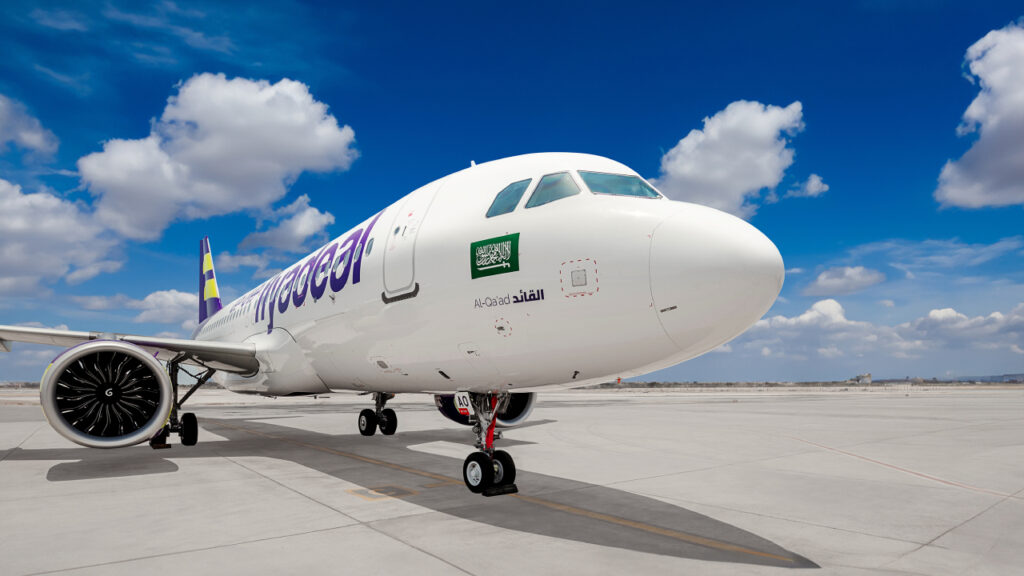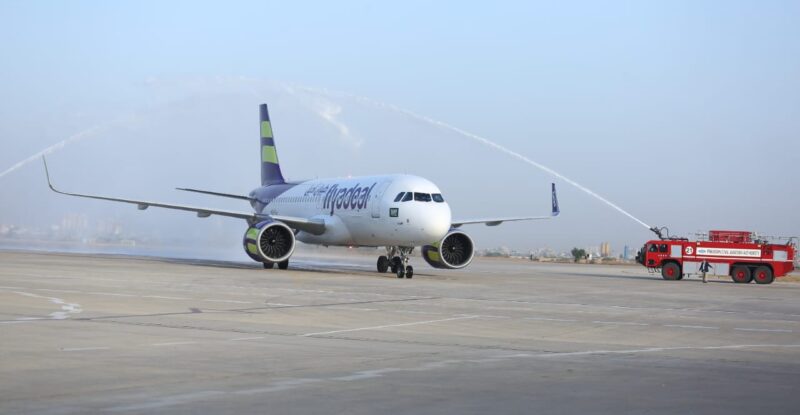If you ever get the chance to talk to flyadeal CEO Steven Greenway, don’t be surprised if you walk away from the conversation with a fresh interest in exploring Saudi Arabia as a tourist destination.
The industry veteran, who was appointed to helm the fast-growing low-cost carrier in 2024, is an impressive ambassador for both the country and its Vision 2030 reforms, as Runway Girl Network learned during an in-depth video interview.
“There’s many parts to the Vision,” Greenway said of Saudi Arabia’s plan for becoming a more open, competitive, and investor-friendly destination.
“You hear about all the big, large-scale projects and everything, but there’s also a lot of stuff that unfortunately doesn’t get too much press time, like equality in the workforce, longevity, homeownership, health, etc.”
In 2019, Saudi Arabia announced it would offer tourist visas for the first time. Prior to that, you could only enter the country to work or for a pilgrimage, which was tightly controlled.
“You’d come into Jeddah, you’d do your thing for three or four days, you’d have to leave, and a tour operator would take care of you; very, very restricted,” Greenway noted.
So, what effectively you’ve seen is they’ve just ripped the band aid off and gone, ‘right, the Kingdom’s open. Here we go.’ And we’re playing part of that.
Indeed it is. A subsidiary of the Saudia Group, Jeddah-based flyadeal operates a fleet of all-economy Airbus narrowbodies, plus three leased Airbus A330s, on 127 routes.
The LCC is growing quickly. In the first six months of 2025, its passenger numbers increased 25% year-over-year to just over five million which, it says, outstripped its 21% growth in seat capacity. In July alone, the carrier flew more than 1 million people.
 In the coming years, flyadeal will receive ten new Airbus A330neos plus 55 more all-economy A320/A321neos.
In the coming years, flyadeal will receive ten new Airbus A330neos plus 55 more all-economy A320/A321neos.
Its A330neo LOPA (layout of passenger accommodations) is being specked out now, Greenway said, and will likely see a higher-density layout, 420 seats or thereabouts, and include a small premium cabin of about 20 seats.
These A330neos will predominantly fly to the Indian subcontinent — flights of five to seven hours — and also punch down to Southeast Asia, with 10-plus hour flight times.
Moving around Saudi Arabia
Driving flyadeal’s growth are several factors, Greenway confided. First and foremost, there is a utility angle. Saudi Arabia’s large landmass — it is the 13th largest country in the world — and population of over 32 million people has created a sizable domestic market.
The UAE, Kuwait and Bahrain don’t have that, he noted.
“We’re one of the larger domestic entities. So, number one is just getting people moving around the Kingdom. There’s rail and road. But you know, when you’re going between Jeddah and Riyadh, you don’t want to take 24 hours. You want an hour-and-a-half flight.
“So, we’re opening up the Kingdom and all the new parts, and there’s also new airports opening up, like Red Sea and so forth. And we’re facilitating that.”

flyadeal chief executive officer Steven Greenway, pictured left, with chief operating officer Captain Abdulaziz Bahri, celebrating an order for 10 Airbus A330neo widebodies
Freedom is sweet
“Number two,” he said, “is, obviously we’re taking Saudis overseas because they’ve got newfound freedom. So, a good example of that is women could not travel unescorted only five to 10 years ago. So, I always have a smile on my face if I’m going to Dubai and I see a bunch of girls, you know, 18, 19 looking forward to having a good time in Dubai. You would say, ‘well, I see that in Las Vegas and everything,’ yeah, but it wasn’t here.
“And so, you now see that these are new market segments that are opening up that didn’t exist before. So, Saudis are moving around a lot more than they used to.”
Inbound traffic: laborers, pilgrims and tourists
Ultimately, the critical component — including as part of Vision 2030 — is inbound traffic. “So, there’s a couple of segments to this,” said the flyadeal CEO.
“There’s the worker traffic — they always play a large part in the Kingdom and the Middle East, driving buses, building roads, building buildings, etc. You then have the religious traffic, which really no other country has on this scale, obviously, with the pilgrimage to Mecca: the Hajj, the Umrah, etc, so that’s huge and growing exponentially, particularly Umrah because that’s all year round.”
And the final piece is tourism, people coming to the country, exploring it for the first time, particularly the Red Sea and al-Ula, the ancient Arabian oasis city.
Tourism is certainly growing in Saudi Arabia, but building out this segment will take time. Greenway noted:
Dubai wasn’t an overnight success. They’ve been building this for 40, 45 years. And it’s really only in the past 10, 15 years, that they’ve really turbo-charged and become a destination in themselves, as opposed to a transfer point on Emirates…
So that last piece, you’re seeing all the big projects coming online in the next couple of years; we’re facilitating that. And I think, slowly but surely, that will happen. And what I think will happen sooner is those coming for religious purposes will then start looking around the Kingdom, not just going to Mecca.
I always give the equivalent, and it’s a very bad one. You’re a Roman Catholic. You go to Rome to see the Pope, and then you go to Milan to go shopping. Think of that type of ‘okay, I’m going to go out and explore Italy now.’ We’re underpinning that. The domestic market is growing at 15% year-on-year at this moment in time, compound. So it’s growing rapidly, and what we’re doing is obviously feeding that by providing domestic connectivity, allowing Saudis to go overseas, and bringing people in as we expand our network.
For women, wearing an abaya is no longer required in Saudi Arabia.
Next steps
In terms of growth targets for 2025, Greenway reckons the Jeddah-Riyadh route could be the world’s busiest route by the end of the year.
“We’re still 75% domestic at this moment in time,” he told Runway Girl Network, “but international is growing rapidly, so we’ll be 50/50 probably in the next two years. That is 50% of our network is going to be international, 50% is going to be domestic.
“So a lot of the growth, a lot of the aircraft that you’ll see coming into our fleet will be flying internationally over the next couple of years and the A330neos are part of that.”
He also has a “backyard” strategy because there are a lot of places in the Middle East that flyadeal doesn’t serve. “We don’t fly to Bahrain. We don’t fly to Doha, as an example,” he said.
The backyard strategy
But the destinations that get him excited are in the likes of Iraq, Syria, and Lebanon, places that are opening up.
“If you asked me 12 months ago if we’d be flying to Iraq, I’d be sitting there going, ‘I don’t think we can.’ We’re now flying to Iraq. Syria is opening up, where we’re looking to get to go into Damascus. We’ve never flown into Syria before, but now the Civil War is over, [there are] opportunities.
“Now that Syrian airspace is open, I can now get to Lebanon economically… So there’s this stuff that was closed to us or not accessible to us only six months ago, that’s now opening up. The region is very, very dynamic.”
“Further afield,” he added, “we’re opening up Pakistan. We’ve just launched three new destinations in Pakistan, including Islamabad. We had already been operating Karachi. So Pakistan is heavy. India, you’ll probably see us starting services by the end of the year as well. And next year we’ll start going into Europe [not just seasonally, as flyadeal does at present, but year-round]. Now, beyond that, that’s when the A330neos come into play. And obviously the routes … are very, very long-haul down to Southeast Asia.
“So domestic is still our playground and our bread and butter. Our backyard has some really, really interesting opportunities that are opening up to us that weren’t even open to us six months ago. Pakistan, India, a bit of Europe next year, particularly southeast Europe. And then you’ve got the A330neos coming in and having that transcontinental play.”

According to trusted global aviation data analytics firm Cirium, flyadeal was the world’s most punctual airline in June. Image: flyadeal
Related Articles:
- Saudi Arabia’s aviation growth story includes Neo Space Group
- Saudi start-up Riyadh Air eyes world class PaxEx with 787s
- Press Release: flyadeal announces sustainability drive, Geven seat deal
- Press Release: Saudi Arabia, UK sign one-stop security agreement
All images credited to flyadeal












